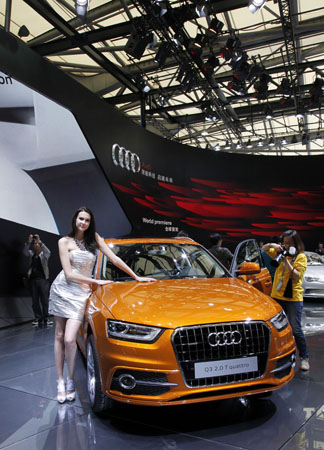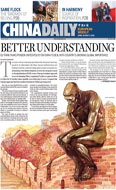Cars
Battle for SUV market share heats up
Updated: 2011-04-22 10:21
By Andreas Cremer and Chris Reiter (China Daily)
|
 |
|
An Audi AG Q3 vehicle on display at the 2011 Shanghai Auto Show. Automobile manufacturers are hoping to tap into the Chinese SUV market. [Photo / Agencies] |
SHANGHAI - Audi AG will pit the Q3 compact sport utility vehicle against Bayerische Motoren Werke AG's (BMW) X1 as the two luxury-car makers vie to tap demand for SUVs geared to urban areas.
"We're paying heed to a fast-growing segment," Michael Dick, Audi's development chief, said in an interview at the Shanghai auto show. "There's a strong appetite for mobility in expanding urban centers. The Q3 will be most appealing to that end, especially for female drivers."
| ||||
Audi, based in Ingolstadt, Germany, aims to challenge BMW's leading position in the segment, which the world's largest luxury car maker created with the X1's introduction in late 2009. BMW delivered nearly 100,000 X1s in 2010, accounting for 8.2 percent of overall sales. The model is part of Audi's strategy to topple BMW as the global luxury-car leader by 2015.
High-end car makers are expanding their lineups of small cars to attract urban drivers and meet tighter environmental regulations. Daimler AG's Mercedes-Benz is also planning a compact SUV. Mercedes will begin rolling out an expanded range of four compacts with an overhauled B-Class later this year. Fiat SpA's Alfa Romeo is planning a small SUV as part of its return to the United States.
"It's a vehicle that suburban mommies will use to haul their kids around," said Christoph Stuermer, a Frankfurt-based analyst with IHS Automotive. "It's a niche alternative for big urban areas in Europe, China and Japan."
BMW sells the X1, the company's second-best selling SUV after the X5, in all markets outside North America. The model helped the brand extend its lead over Audi in the first quarter, with sales rising 21 percent to 321,175 vehicles, compared to Audi's 18 percent advance to 312,600. The Munich-based car maker, which installed cleaner engines in the top-of-the-line X1 this year, intends to defend its position.
"We are aware that the Q3 is coming," said Andreas Lampka, a BMW spokesman. "The X1 is the leader in its segment, and we intend to keep it that way."
The Q3 intensifies the two car maker's SUV battle. BMW revamped the X3 mid-sized model and moved production to its US factory in South Carolina late last year in a bid to cut into North American demand for Audi's Q5. Audi responded by adding a fuel-efficient four-cylinder engine to the Q5's range. A hybrid version of the Q5 is planned for later this year.
Audi's Q3, based on the same technology platform as Volkswagen's Tiguan, starts at 2,300 euros more than the X1. Volkswagen announced plans on Wednesday to expand daily production of the Tiguan to 1,000 SUVs from the current 700 to keep up with rising demand.
The Q3 will initially be available in three models with four-cylinder engines delivering as much as 211 horsepower. The top engine model has a maximum speed of 230 kilometers an hour and accelerates to 100 kilometers an hour in 6.9 seconds.
The Q3, Audi's third SUV, will be built at a plant in Martorell near Barcelona, helping Volkswagen's struggling Seat unit fill assembly lines. Production may be expanded to China, the world's biggest car market. BMW is also considering such a move.
"We used to think that China is no real market for SUVs, but the success of the Q5 and Q7 have been proving us wrong," Dietmar Voggenreiter, head of Audi's China operations, said in Shanghai. "The Q3 will be our entry model to that segment, a city-urban car."
Bloomberg News
E-paper

Head on
Chinese household care goods producers eye big cities, once stronghold of multinational players
Carving out a spot
Back onto center stage
The Chinese recipe
Specials

British Royal Wedding
Full coverage of the royal wedding of Prince William and Kate Middleton in London. Best wishes

The final frontier
Xinjiang is a mysterious land of extremes that never falls to fascinate.

Bridging the gap
Tsinghua University attracts a cohort of foreign students wanting to come to China.




